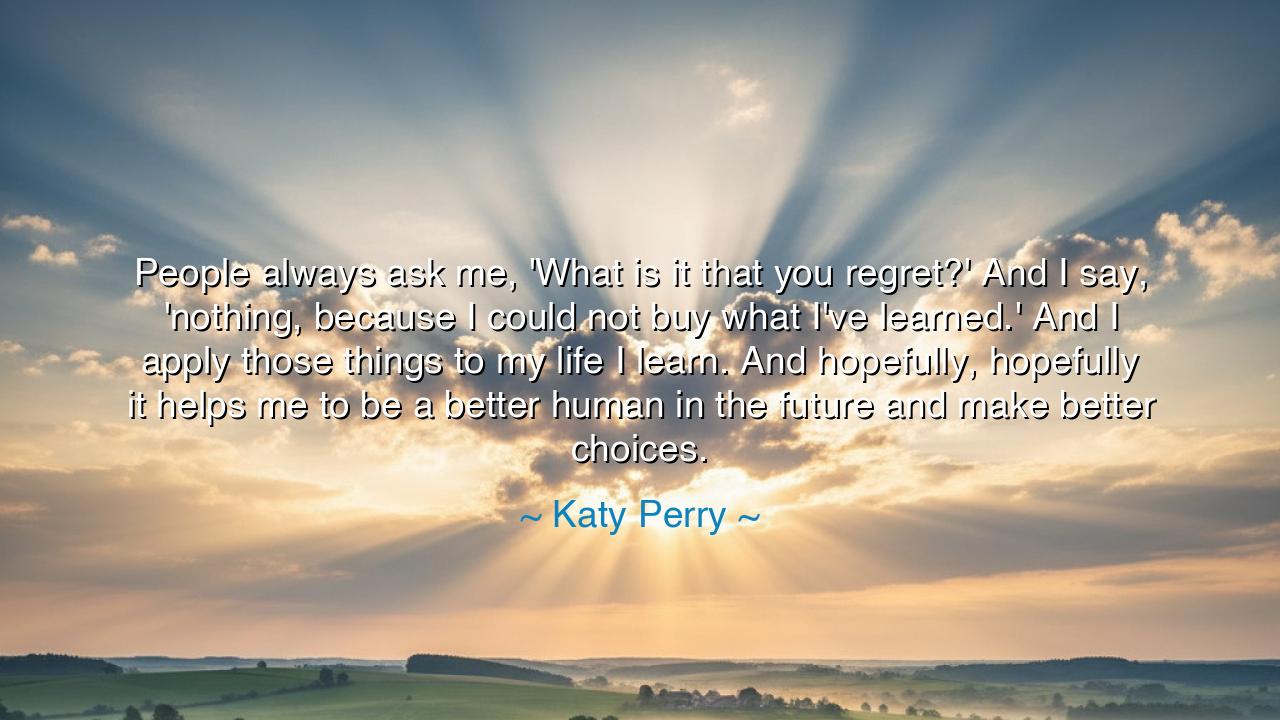
People always ask me, 'What is it that you regret?' And I say
People always ask me, 'What is it that you regret?' And I say, 'nothing, because I could not buy what I've learned.' And I apply those things to my life I learn. And hopefully, hopefully it helps me to be a better human in the future and make better choices.






"People always ask me, 'What is it that you regret?' And I say, 'nothing, because I could not buy what I've learned.' And I apply those things to my life I learn. And hopefully, hopefully it helps me to be a better human in the future and make better choices." These powerful words from Katy Perry echo the timeless understanding that growth and wisdom are not commodities that can be bought or acquired easily. Rather, they are the fruits of experience—often painful, sometimes joyful, but always transformative. In the ancients’ view, wisdom was considered the highest form of knowledge, one that could only be attained through the living of life, through trial, error, and reflection.
The idea of learning through experience resonates deeply with the teachings of Socrates, who famously declared, "The unexamined life is not worth living." In his time, the pursuit of wisdom was not about accumulating material wealth or status, but about striving to understand the nature of one’s own life and choices. Socrates believed that it was through reflecting on our actions, questioning our motives, and learning from our mistakes that we grow. Katy Perry’s insight is much the same—she acknowledges that regret is not a productive force in her life, because the lessons she has gained through experience are invaluable and cannot be bought. Her wisdom lies in the understanding that personal growth is an ongoing process, and the mistakes she’s made are merely stepping stones on the path to becoming a better version of herself.
The Stoics, too, placed great emphasis on the value of experience as a teacher. Marcus Aurelius, in his Meditations, wrote, “The impediment to action advances action. What stands in the way becomes the way.” For the Stoics, challenges and setbacks were not to be feared but embraced, for they offered the opportunity to learn and evolve. Just as Katy Perry reflects on her past and chooses not to dwell in regret, the Stoics taught that we should take each obstacle and use it as a means to refine our character. The wisdom that comes from life’s trials is often more valuable than any material possession, for it shapes the soul and prepares us for the future.
Consider the example of Thomas Edison, whose path to success was fraught with failure and rejection. He famously said, “I have not failed. I’ve just found 10,000 ways that won’t work.” Edison’s failures did not define him, but instead, they were integral to his learning and eventual success. Like Perry, Edison recognized that the lessons he learned along the way could not be purchased. The wisdom he gained was the direct result of his efforts, struggles, and perseverance. Edison’s story is a testament to the idea that the value of learning is found not in avoiding mistakes but in embracing them as opportunities for growth.
This brings us to the essential lesson that Perry’s words impart: the pursuit of wisdom is a lifelong journey. Each experience—good or bad—adds to the tapestry of our lives, contributing to the person we are becoming. Regret has no place in this process, because it is the lessons learned from our experiences that truly shape our future. Just as the ancient philosophers believed, we must embrace our mistakes, for they hold the keys to our growth. It is not the absence of mistakes that makes us wise, but the ability to learn from them and apply those lessons to make better choices in the future.
The practical wisdom from this quote is one of acceptance and growth. Instead of dwelling on the things we cannot change—our past actions or the mistakes we’ve made—we must focus on what we can learn from them. Each day is an opportunity to reflect on the lessons life offers, to elevate our understanding, and to make choices that are more aligned with our highest self. We can choose to regret, or we can choose to learn and become better. This is the essence of personal mastery—not avoiding failure, but using it as a tool for growth and self-improvement.
Let us take action by embracing our experiences, both the triumphs and the failures, and viewing them as teachers that shape our journey. Like Perry, we must see our mistakes as invaluable lessons, and like the Stoics, we must understand that every challenge we face is an opportunity to refine our character and deepen our wisdom. By learning from our past and acting with intention, we can create a future that reflects our growth, our learning, and our commitment to becoming better human beings.






AAdministratorAdministrator
Welcome, honored guests. Please leave a comment, we will respond soon